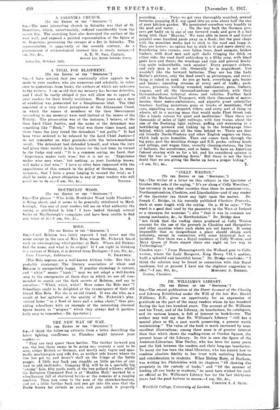A TRIAL FOR BLASPHEMY.
[To me EDITOR or ma fivzortroa."] tile,-1 have noticed that you continually allow appeals to be made to your readers, who are numerous and scholarly, in refer- ence to quotations from books, the authors of which are unknown to the writers. I em so old that my memory has become defective, and I shall be vastly obliged if you will allow me to appeal to your readers for their kindly assistance. Many years ago a man of erudition was prosecuted for a blasphemous libel. The libel consisted of a very clever paraphrase of the Athanasian Creed, in which the names of members of the then Government (according to my memory) were used instead of the names of the Trinity. The prosecution was at the instance, I believe, of the then Lord Chief Justice, and the name of the defendant was something like " Hook." The trial was three times heard, and three times the jury found the defendant " not guilty." It had been twice ordered to be reheard by the Lord Chief Justice—I do not remember on what grounds—with the before-mentioned result. The defendant had defended himself, and when the jury had given their verdict in his favour for the last time, he turned to the Judge and said "It is a common saying, me Lord, that ' Experience makes fools wise,' but it is not ea. 'Experience makes wise men wiser,' but nothing, as your Lordship knows, will make a fool wise." I have so often been impressed with the appositeness of this remark to the policy of Germany, in many instances, that I have a great longing to re-read the trial; so I shall be under a great obligation to any of your readers who will
as-dst me to do so.—I am, Sir, Ac., STULTUS.














































 Previous page
Previous page